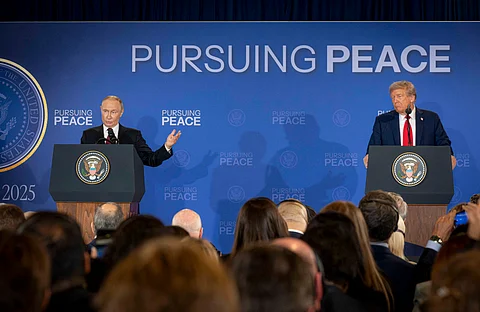

Russian President Vladimir Putin has publicly supported U.S. President Donald Trump’s assertion that the Ukraine war would not have occurred had Trump been in office in 2020.
The endorsement came during a summit at Joint Base Elmendorf-Richardson in Anchorage, Alaska, on Friday.
Putin’s remarks align with Trump’s repeated claims, made both on the campaign trail and after reclaiming the presidency, that the conflict could have been avoided under his leadership.
Critics, however, have challenged Trump’s narrative, arguing that it oversimplifies the war’s origins and the roles of Ukraine and the Biden administration.
Putin emphasized that U.S.-Russia relations had deteriorated significantly under the Biden administration, reaching what he described as "the lowest point since the Cold War."
He noted the absence of summits between the two nations over the past four years, stating, "That's not benefiting our counties and the world as a whole."
The Anchorage meeting, which lasted nearly three hours, marked a shift toward dialogue, with Putin expressing hope that it could pave the way for "mutually beneficial and equal ties" despite ongoing challenges.
The Russian delegation included key figures like Foreign Minister Sergey Lavrov and Defense Minister Andrey Belousov, while Trump was joined by officials such as Secretary of State Marco Rubio and CIA Director John Ratcliffe.
The summit focused heavily on the Ukraine conflict, with Putin stressing Moscow’s desire to end the hostilities, describing the situation as "a tragedy and a great pain for us."
Trump called the discussions "highly productive," though no formal agreement was reached.
Putin praised Trump’s commitment to understanding the conflict’s history, calling it "precious."
However, the meeting drew criticism for its optics, particularly in light of Trump’s earlier contentious White House encounter with Ukrainian President Volodymyr Zelenskyy, where Trump criticized Zelenskyy’s approach to the war.
Despite the lack of a finalized deal, both leaders expressed optimism about continued dialogue to resolve the conflict.